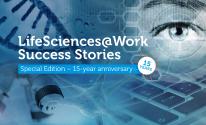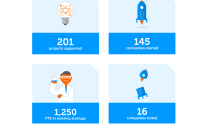
The story of Sirius Medical and TargED
From PhD student to CEO and COO
INTERVIEW
with Bram Schermers and Marc van Moorsel
From PhD student to CEO and COO. This happened to Bram Schermers, CEO of Sirius Medical and Marc van Moorsel, COO of TargED. Both participated in the Venture Challenge, Schermers in 2015 and Van Moorsel in 2018. In this interview, Schermers talks about his MedTech company and Van Moorsel about his Biotech company. Read further and discover what the Venture Challenge has meant for the two former PhD students.

How TargED started
Van Moorsel just started his PhD and was asked by his copromotor and a postdoc to join them in the Venture Challenge. ‘When we got there, I didn’t even know what drug we were talking about. My team put me in the lead and all of a sudden I was filling in a business canvas. I didn’t know the answers, but neither did any of us. In the following two years, I had the curiosity to find out everything I needed to know about how start a company’.
During his PhD, Van Moorsel worked on TargED next to his scientific (PhD)research. ‘Without the support of my promotors and the belief that Microlyse could potentially be a drug in the treatment of Thrombosis, I don't believe we would be where we are today. TargED is well funded, and moving forward towards the clinic.
In some months, I spent less than 50% of my time doing research and worked hard on moving the company forward. As long as the research kept going, my promotors were happy for me to work on drug development simultaneously. They highly value the idea of this new molecule going to market and helping patients.’
Van Moorsel believes that university brings fundamental understanding. ‘During my PhD I developed in depth knowledge on our drug. However, what it means to bring a drug to market is something no course can teach. That is why having an experienced entrepreneur on board is an absolute must. This is when Kristof Vercruysse joined the team.
He has over 20 years of experience in bringing biopharmaceutical compounds from preclinical proof of concept towards market authorization. ‘Kristof joined as CEO of the company. I wanted to finish my PhD and at the same time learn as much as possible about building TargED. I had the wonderful opportunity to do so in my COO role.’

How Sirius Medical started
‘During my PhD, the idea of developing my technology into a commercial entity had already stuck with me. However, I had learned nothing about how to do this during my education.’ Schermers adds, ‘Initially, I had an unrealistic image of what it would be like to start a company. I imagined that it would be like Silicon Valley, young people developing disruptive technology and shaking up the market.’
Schermers decided to take the reins. This led to participation in several courses, including the Venture Challenge.
‘Hubert Martens, an experienced entrepreneur, and Schermers decided to team up at a very early stage of building the business. ‘Through working with Hubert, I quickly realised that in highly regulated environments, like pharma and MedTech, it doesn’t work like in Silicon Valley. It takes people who know the ropes. Since building a company can’t be learnt from books, you can either learn through making mistakes or by learning from people who have done it before.’ Schermers continues, 'With Huberts help, Sirius Medical was able to grow.
I was able to look over his shoulder and became CEO of the company in 2020. Without Hubert by my side, we could never have gotten CE approval in two years and FDA clearance within three years.’ Schermers does face a dilemma, because choosing between finishing his PhD and putting time and effort into Sirius Medical, isn’t easy. ‘I thrive when I get to learn new things. At a certain point during my PhD, I realised that I went through the learning curve and that defending my thesis is only going to bring me a title. I rather spend my time on the company.’
Exit Strategies
Both entrepreneurs have thought about their exit strategy. Van Moorsel ‘In upcoming development years, we will only ever spend money and never earn one Euro on sales. We plan to complete two phase 2 studies with the invested money. We are already engaging with large pharma companies and hope to stay on their radar. Ideally they will want to add our drug to their portfolio, buy the company and do the phase 3 study, which easily costs over 150 million Euro. These large corporates have all the infrastructure in place to get EMA and FDA approval, to do market access and marketing and sales.’
For Sirius Medical the strategy is very different. Schermers explains ‘Building a large sales and marketing organisation for a single product is inherently inefficient. It is typical for MedTech companies to bring their technology to a certain commercial maturity level, at which point more value can be created as part of a larger organisation’s broader technology portfolio. ’

Venture Challenge tips
Van Moorsel and Schermers both agree that the Venture Challenge gives you valuable insights. ‘You can join and think this is for me or this isn’t for me. Either way, you’ve learned something’, Schermers says. Van Moorsel adds, ‘With the Venture Challenge, you’ll find out in two days if entrepreneurship is of your interest or whether you’d much rather do scientific research. Then you’ll immediately know where you stand.’
Schermers also concludes that you really do need to ask a lot of “dumb” questions. Van Moorsel adds, ‘The nice thing during the Venture Challenge was that silly questions were encouraged. The coaches definitely gave us the impression that if you didn’t ask such questions, you wouldn’t get anywhere’.
‘I remember that at some point I asked, ‘What is the most important thing for investors?’ The answer was, ‘Make sure you have a solid team’, says Schermers. ‘And bring in an experienced industry entrepreneur who understands where you want to go. They already know the pitfalls and opportunities based on their own experience’, van Moorsel adds.








